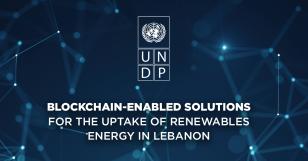Blockchain-Enabled Solutions for the Uptake of Renewables Energy in Lebanon

Blockchain-Enabled Solutions for the Uptake of Renewables Energy in Lebanon
November 26, 2020
The situation of the Lebanese Electricity sector is alarming and placing a significant burden on the national economy and people. With electricity tariffs heavily subsidized, these expenses substantially contribute to the country’s national debt. Furthermore, since EDL is still unable to provide 24/7 electricity supply, citizens and companies are forced to use pollutive and expensive private generator to cope with shortages. While the necessary reform of the electricity sector is yet to be implemented, distributed renewable energy has the potential to address these developmental challenges in a market-based manner while creating sustainable employment opportunities along its value chain.
To fully unlock the potential of distributed renewable energy, UNDP has explored blockchain-based solutions for the renewable energy sector in Lebanon. This study has first identified these real-world applications and development of commercial-size blockchain-based energy business models through desk researches, interviews and the collection of working use-cases from the fast-evolving blockchain space. Taking into consideration the specific context of Lebanon, the study has identified suitable blockchain-enable solutions for the uptake of renewable energy in relatively short-term as well as the set of recommendations for deployment. To practically serve business developers, energy-related companies and policymakers, this report aims to map a clear procedure for deploying blockchain-enabled energy solutions in Lebanon.
This study was funded by the Kingdom of the Netherlands.
Note: Due to the specific nature of blockchain-based solution, the names of the companies are included in this report to explain the real-use cases of blockchain-enable solutions. However, UNDP is not promoting these companies, but assessed the applicability of specific modalities and business models used by these companies.

 Locations
Locations